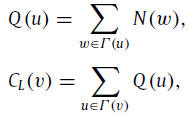Semi Local Centrality
Definition
The local centrality CL(v) of node v is defined as:
 where Γ(u) is the set of the nearest neighbors of node u and N(w) is the number of the nearest and the next nearest
neighbors of node w.
where Γ(u) is the set of the nearest neighbors of node u and N(w) is the number of the nearest and the next nearest
neighbors of node w.
The local centrality is proposed aiming at identifying the influencers in undirected network, it can be applied to directed network as well with a modified definition of N(w). Of course, for directed network, N(w) should be the number of the nearest and next nearest upstream nodes of node w.
Local centrality measure is likely to be more effective to identify influential nodes than degree centrality measure as it utilizes more information, while it has much lower computational complexity than the betweenness and closeness centralities.
See
Dong, J., Ye, F., Chen, W. and Wu, J., 2018, May. Identifying influential nodes in complex networks via semi-local centrality. In 2018 IEEE International Symposium on Circuits and Systems (ISCAS) (pp. 1-5). IEEE.

The local centrality is proposed aiming at identifying the influencers in undirected network, it can be applied to directed network as well with a modified definition of N(w). Of course, for directed network, N(w) should be the number of the nearest and next nearest upstream nodes of node w.
Local centrality measure is likely to be more effective to identify influential nodes than degree centrality measure as it utilizes more information, while it has much lower computational complexity than the betweenness and closeness centralities.
See
Dong, J., Ye, F., Chen, W. and Wu, J., 2018, May. Identifying influential nodes in complex networks via semi-local centrality. In 2018 IEEE International Symposium on Circuits and Systems (ISCAS) (pp. 1-5). IEEE.
Computational complexity
O(n(k)2)
Software
References
- CHEN, D., LÜ, L., SHANG, M.-S., ZHANG, Y.-C. & ZHOU, T. 2012. Identifying influential nodes in complex networks. Physica A: Statistical Mechanics and its Applications, 391, 1777-1787. DOI: 10.1016/j.physa.2011.09.017

